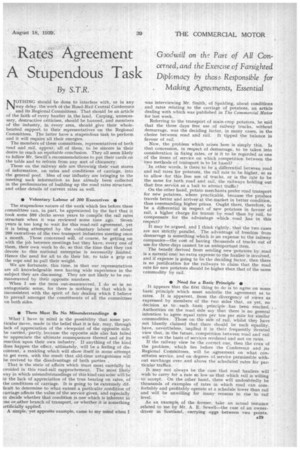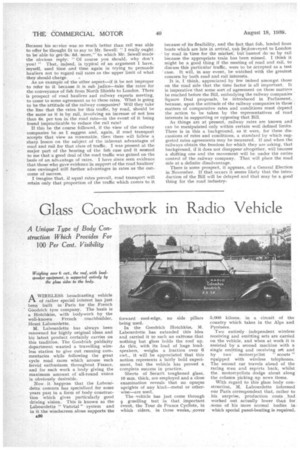Rates Agreement A Stupendous Task
Page 31

Page 32

If you've noticed an error in this article please click here to report it so we can fix it.
Goodwill on ay? Part of All Concerned, and the Exercise of Farsighted Diplomacy by thos3 Responsible for , Making AgreEments, Essential
By S.T.R.
NOTHING should be done to interfere with, or in any way delay. the work of the Road-Rail Central Conference and its Regional Committees. That should be an article of the faith of every haulier in the land. Carping, unnecessary, destructive criticism, should be banned, and members of the industry, in every area, should .give their wholehearted support to their representatives on the Regional Committees. The latter have a stupendous task to perform
and it will require all their energies. • The members of these committees, representatives of both road and rail, appear, all of them, to be sincere in their desire to reach an equitable conclusion. They all seem likely to follow Mr. Sewill's recommendations to put their cards on the table and to refrain from any sort of chicanery.
Those on the railway side are throwing their vast stores of information, on rates and conditions of carriage, into the general pool. Men of our industry are bringing to the meeting such information as has already been collected in the preliminaries of building up the road rates structure, and other details of current rates as well.
• Voluntary Labour of 200 Executives • The stupendous nature of the work which lies before these committees can, in part, be appreciated by the fact that it took some 500 clerks seven years to compile the rail rates structure when it was reviewed some time ago. Seven' years is too long to wait for this road-rail agreement, yet it is being attempted by the voluntary labour of about 200 executives of the two transport industries meeting once a month. Those concerned will, of course, be getting on with the job between meetings but 'they have, every one of them, their own work to do, so that the time that they can devote to this national enterprise is necessarily limited. Hence the need for all to do their bit, to take a grip on the rope and to pull their weight.
We are fortunate, this time, in that our representatives are all knowledgeable men having wide experience in the subject they are discussing. They are not likely to he outmanceuvred by their opposite numbers.
When I use the term out-manoeuvred, I . do so in no antagonistic sense, for there is nothing in that which is inconsistent with the spirit of fair dealing which I believe to prevail amongst the constituents of all the committees on both sides.
• There Must Be No Misunderstandings •
What I have in mind is the possibility that some particular move, made in the belief that it is fair, may, through lack of appreciation of the viewpoint of the opposite side, be carried, partly because the opposite side also has failed to appreciate the ultimate consequences thereof and of its reaction upon their own industry. If anything of the kind 'does happen the effect, ultimately, will be a feeling of discontent, a rankling which will show itself in some attempt to get even, with the result that old-time antagonisms will be revived to the disadvantage of both parties .
That is the state of affairs which must most carefully be avoided in this road-mil rapprochement. The most likely way in which misunderstandings of this kind can arise will be in the lack of appreciation of the true bearing on rates, of the conditions of carriage. It is going to be extremely difficult to determine to what extent a particular condition of carriage affects the value of the service given, and especially to decide whether that condition is one which is inherent in me or other branch of transport, or whether it is something artificially applied.
A simple, yet apposite example, came to my mind when I
was interviewing Mr. Smith, of Spalding, about conditions and rates relating to the carriage of potatoes, an article dealing with which was published in The Commercial Motor for last week.
Referring to the transport of main-crop potatoes, he said that the three days free use of railway trucks, without demurrage, was the deciding factor, in many cases, in the choice between road and rail. It tipped the balance in favour of rail.
Now, the problem which arises here is simply this. Is that concession, in respect of demurrage, to be taken into consideration in fixing rates, or is it to be regarded as one of the items of service on which competition between the two methods of transport is to be based?
In other words, is there to be a differential between road and rail rates for potatoes, the rail rate to be higher, so as to allow for this free use of trucks, or is the rate to be the same for both road and rail, the railways holding out that free service as a bait to attract traffic?
On the other hand, potato merchants prefer road transport for new potatoes, where practicable, because the produce travels better and arrives' at the, market in better condition, thus commanding higher prices. Ought there, therefore, to be a differential in respect of new potatoes in favour of rail, a higher charge for transit by road than by rail, to compensate for the advantage which road has in this respect?
It may he argued, and I think rightly, that the two cases are not strictly parallel. The advantage Of freedom from demurrage is something which is an expense to the railway companies—the cost of having thousands of trucks out of use for three days cannot be an unimportant item, ,
The benefit derived from sending new -potatoes by road is a natural one: no extra expense to the haulier is involved, and if expense is going to be the deciding factor, then there is no justification for the railways to claim that the road rate for new potatoes should be higher than that of the same commodity by rail.
• Need for a Basic Principle • It appears that the first thing to do is to agree on some basic principle which must underlie the agreement as to rates. It is apparent, from the divergency of views as expressed by members of the two sides that, as yet, no decision as to such • basic principle has been reached. ; Authorities on the road side say that there is no general intention to agree equal rates per ton per mile for similar commodities. Those on the side of rail, whilst they have not bluntly claimed that there should be such equality, have, nevertheless, implied it in their frequently iterated view that, in the future, competition between road and rail will be on the basis of services rendered and not on rates.
If the railway view be the correct one, then the crux of the problem, which lies before the Conference and its Regional Committees, will be agreement on what constitutes service, and on degrees of service permissible without surcharge over_and above the scheduled rates for particular traffics.
It may not always be the case that road hauliers will wish to carry for a rate so low as that which rail is willing to accept. On the other handy there will undoubtedly be thousands of examples of rates in which road can comfortably and profitably operate at a schedule lower than rail and will be unwilling for many reasons to rise to rail level.
As an example of the former, take an actual instance related to me by Mr. A. E. Sewell—the case of an ownerdriver in Scotland, carrying eggs between two points. a29 Because his sfavice was so much better than rail was able to offer he thought fit to say to Mr. Sewell: I really ought to be able to get2s. 6.d. more," to which Mr. Sewell made the obvious reply: " Of course you should, why don't you? " That, indeed, is typical of an argument I have, myself, used time and time again in trying to persuade hauliers not to regard rail rates as the upper limit of what they should charge.
As an example of the other aspect—if it be not improper to refer to it because it is sub judice—take the rates for the conveyance of fish from North Shields to London. There is prospect of road hauliers and railway experts meeting, to come to some agreement as to these rates. What is going to be the attitude of the railway companies? Will they take the line that the rates for this traffic, by road, should he the same as it is by rail, involving an increase of not less than 6s. per ton in the road rate—in the event of it being found impracticable to reduce the rail rate?
If this be the course followed, if the view of the railway companies be as I suggest and, again, if road transport accepts that view as reasonable, then there will folitlw a sharp lesson on the subject of the inherent advantages of road and rail for that class of traffic. I was present at the major part of the hearing of the fish case and it seemed to me that a good deal ,af the road traffic was gained on the basis of an advantage of rates. I have since seen evidence that those who gave evidence in support of the road hauliers' case envisaged still further advantages in rates as the outcome of success.
I imagine that, if equal rates prevail, road transport will retain only that proportion of the traffic which comes to it because of its flexibility, and the fact that fish, landed from boats which are late in arrival, can betonveyerl to London by road in time for the market; but Cannot do so by rail because the appropriate train has been missed. I think it might be a good thing if the meeting of road and rail, to discuss this particular traffic, were to be accepted as a test case. It will, in any event, be watched with the greatest concern by both road and rail interests.
It is, I think, appreciated by few indeed amongst those on the road side that the time factor is all important. It is imperative that some sort of agreement on these matters he reached before the Bill, embodying the railway companies Square Deal proposals, be introduced in Parliament, because, upon the attitude of the railway companies in these matters of comparative rates and conditions must depend the action to be taken by the representatives of road interests in supporting or opposing that Bill.
As things are at present, railway rates are known and can be manipulated only within certain well defined limits. There is in this a background, as it were, for these discussions of rates and conditions, a standard by which suggested rates agreements may be measured. If and when the railways obtain the freedom for which they are asking, that background, if it does not disappear altogether, will become a shifting one and the movement will be under the entire control of the railway company. That will place the road side at a definite disadvantage.
There is some prospect, it appears, .of a General Election in November. If that occurs it seems likely that the introduction of the Bill will be delayed and that may be a good thing for the road industry.




































































